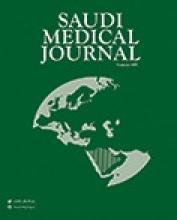To the Editor
I read with interest the study by Seidahmed et al1 on the epidemiology of neural tube defects (NTDs). It has inspired me to throw light on the continuously growing health problem of NTDs in Iraq, and compare it with the data from the Kingdom of Saudi Arabia (KSA). I would like to address the following 3 points.
First, Seidahmed et al1 mentioned that the prevalence of NTDs was 1.2/1000 live births among their studied population. They considered that prevalence high in KSA despite the implementation of fortification of flour with folate since 2001. Seidahmed et al1 did well in comparing that prevalence with those reported in other countries. Their study showed that NTDs prevalence was similar to those found in Gulf Cooperation Council countries and Jordan but it was much lower than those recorded in Palestine, Algeria, Northern Iran, and Sudan.1 Compared with other countries worldwide, NTDs prevalence was similar to reports from Canada, Germany, and USA. However, it was lower than that reported in France, North of England, South Africa, Chile, Turkey, and China.1 Unexpectedly, Seidahmed et al1 did not compare their reported NTDs prevalence with that recorded in Iraq. Iraq is currently considered the country with the highest reported prevalence rate of NTDs in the world, with a mean prevalence of 24.2/1000 live births.2 Actually, the real NTDs magnitude in Iraq is higher than that previously reported. This is based on the following 3 points: 1) The estimated prevalence was related to live births only, and did not include macerated, or malformed babies who might have NTDs; 2) The aforementioned prevalence was estimated from hospital-based rather than community-based data; and 3) Substantial proportion of births in Iraq still take place at home, where home delivery with traditional birth attendant has been noticed to account 31.2% of total births.3 Accordingly, a significant number of babies with NTDs born at home are expected to escape medical registration.
Second, Seidahmed et al1 attributed a high prevalence of NTDs in KSA (1.2/1000 live births) in spite of the implementation of fortification of flour with folate since 2001 to the impact of genetic, syndromic, and chromosomal causes of NTDs, which are not preventable by folate, in addition to other factors, such as unplanned pregnancy, and lack of awareness of the role of folate in preventing nonsyndromic causes of NTDs. Contrary to that, the spike in NTDs prevalence in Iraq (24.2/1000 live births) has been attributed to the cumulative effects of exposure to toxicants, including depleted uranium, maternal malnutrition, gestational folate deficiency, absent national program on dietary folate fortification, and marked psychosocial stress secondary to decades of conflicts Iraq has engaged in.4
Third, an alarming call has been recently submitted to the health authorities and decision makers in Iraq to consider implementing a nationwide program to counteract the stepwise increase in the NTDs prevalence encompassing various epidemiologic, educational, statistical, diagnostic, therapeutic, and preventive measures tailored by related personnel.2 With that program, reduction in NTDs prevalence to the usual worldwide prevalence of 0.5-1/1000 live births5 is solicited. I presume that the implementation of a similar program is highly indicated in KSA to prevent further staggering in NTDs prevalence.
Reply from the Author
We thank Prof. Al-Mendalawi for his valuable comments and recommendations in response to our recently published study on the epidemiology of NTDs. We inadvertently did not include the prevalence of NTDs in Iraq (24.2/1000 live births), which is alarmingly high, given that still births and home deliveries (31.2%) were not included. In our study only live births were included, we did not include cases of termination of pregnancy due to genetic disorders associated with NTDs, which may constitute a significant percentage of NTDs, and in this case, the prevalence in KSA was underestimated, and we consider that the true prevalence is much higher than 1.2/1000 live births. Not like the case in Iraq, almost all deliveries in KSA take place in hospitals.
I agree with Prof. Al-Mendalawi that the cumulative effects of exposure to toxins and environmental pollutions due to relentless wars utilizing all sorts of weapons, including prohibited lethal chemicals and biological weapons in the area has a significant impact on the prevalence of NTDs and other serious human ailments.
We strongly support Prof. Al-Mendalawi’s alarm call submitted to the health authorities and decision-makers in Iraq to be extended to all Arab and Islamic countries, to consider implementing a nationwide program for the reduction of the high prevalence of NTDs, through enhancing the population’s awareness regarding the role of folic acid preconceptional supplementation, and to mandate fortification of flour and staple diets with folic acid. We also suggest a central NTD registry with all participating hospitals in KSA by reporting all cases of NTDs including still births, abortions, and termination of pregnancy associated with NTDs, as such an accurate prevalence could be ascertained, and appropriate plans and programs could be implemented.
Mohammad Z. Seidahmed
Security Forces Hospital, Riyadh, Kingdom of Saudi Arabia
Ethical Consent
All manuscripts reporting the results of experimental investigations involving human subjects should include a statement confirming that informed consent was obtained from each subject or subject’s guardian, after receiving approval of the experimental protocol by a local human ethics committee, or institutional review board. When reporting experiments on animals, authors should indicate whether the institutional and national guide for the care and use of laboratory animals was followed.
- Copyright: © Saudi Medical Journal
This is an open-access article distributed under the terms of the Creative Commons Attribution-Noncommercial-Share Alike 3.0 Unported, which permits unrestricted use, distribution, and reproduction in any medium, provided the original work is properly cited.






